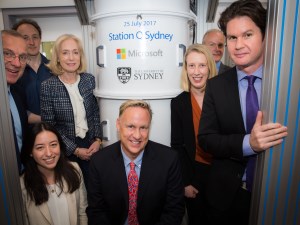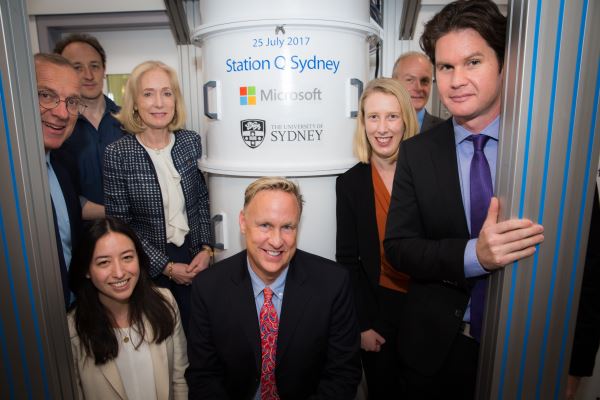Microsoft and the University of Sydney have teamed up to play a key role in the development of the world’s first quantum computer.
Experts say the billion-dollar project will become this generation’s space race.
Microsoft's move means it has now joined Google and IBM in the quest to build the powerful new machine, which promises to launch a new industrial revolution.
At the announcement of the multi-year partnership in Sydney yesterday, the tech giant said the potential for the science was endless and could solve global issues including climate change and medicine.
By performing multiple calculations simultaneously, Quantum computers promise to deliver a massive increase in processing power over conventional computers.
Unlike conventional computers, they use a single electron or nucleus of an atom as the basic processing unit – a quantum bit, or qubit.
When a quantum computer is eventually built, it will be a billion times faster than the types of computers we know today.
Quantum computers could lead to the production of new drugs and play a vital role in health, agriculture and materials science.
They could also pave the way for advanced new security systems, creating totally secure online shopping – and deliver lightning fast database searches.
Potential to transform the global economy
Professor David Reilly, who heads the project, named Station Q Sydney told guests at the official launch that quantum computing is one of the most significant opportunities in the 21stcentury.
“It has the potential to transform the global economy and society at large,” he said.
“The deep partnership between Microsoft and the University of Sydney will allow us to help build a rich and robust local quantum economy.”
The research team will be housed inside the $150 million Sydney Nanoscience Hub which opened in March last year.
The long-term Microsoft investment would bring state-of-the-art equipment, allow the recruitment of new staff, help build the nation’s scientific and engineering talent, and focus significant research project funding into the University.
The team is expected to hire 20 quantum engineers in the next six months.
Why the University of Sydney was chosen
Microsoft's head architect of their quantum computation team Doug Carmean said the tech giant had the luxury of picking a "dream team" of academics from across the world.
The team at the University of Sydney was chosen because it is best placed to get the computer up and running.
"Sydney represents this very unique capability of spanning physics through engineering," he said.
Mr Carmean, who is based at Microsoft’s Redmond, Washington headquarters, said: “It was only 40 years ago that the computing revolution really took hold, realising Microsoft’s vision for personal computers to be on every desktop; Microsoft is now focused on what we see as potentially even more impactful – making the quantum leap.”
The Sydney Station Q team is one of only four Microsoft experimental Station Q teams in the world alongside Purdue University, Delft University of Technology, and the University of Copenhagen.
And Professor Reilly is confident his Sydney team will be the first switch on the quantum machine.
WHAT IS A QUANTUM COMPUTER?
-
Quantum computers produce a completely different form of computing power, and such power will create a whole new technology that we can barely imagine.
-
Traditional computers are binary and use a coding system relying on the numbers 0 and 1, while a quantum computer uses qubits which can be 0, or 1, or any state in between.
-
When this is scaled back, it will be possible to perform not just one calculation at a time based on the coding numbers, but huge volumes of calculations performed in parallel and simultaneously.
-
At present, qubits can only be built in very low temperature and low noise environments.
What makes these computers so great?
-
When a quantum computer is eventually built, it will be a billion times faster than the types of computers we know today.
-
The technology will allow materials to be constructed to include any atoms that would make it stronger or better. For example, it could include the strength of magnates as well as electrical and thermal properties of other atoms.
-
This will allow scientists to build materials and objects never thought possible.
How long will it take to build a quantum computer?
-
Experts say a workable quantum computer is about 10 years away. But many think this year (or the next) could see breakthroughs towards "quantum supremacy" – where quantum machines move beyond the realm of demonstration and overtake the fastest supercomputers for trivial problem solving.
Why Sydney?
-
The University of Sydney's Nanoscience Hub is world class and Microsoft says the academics' expertise in engineering and physics is ideal and extremely rare.
-
It is well placed to be the first place in the world to turn on and operate a quantum computer.


